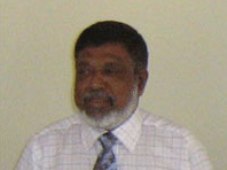Police cordoned the Judicial Services Commission (JSC) on Monday morning, preventing its staff from working or entering the building, while the President’s Office summoned members of the judicial oversight body for questioning at an 11am meeting.
A statement from the Maldives Police Service (MPS) said the office was closed by police at the request of President Mohamed Nasheed, to prevent “unlawful and unconstitutional work from taking place.”
Police cited Article 115[a] of the Constitution, which concerns the powers of the President and reads that he “must faithfully implement the provisions of this Constitution and the law, and to promote compliance by organs of the State and by the people.”
Sub-Inspector Ahmed Shiyam said the President requested police investigate the institution after hearing reports that the JSC had been “open all night acting illegally.”
Speaking to Minivan News, Attorney General Husnu Suood said commission members, including JSC head and Supreme Court Justice Mujthaz Fahmy, met President Mohamed Nasheed and explained that the commission was attempting to finalise work on the reappointment of 160 sitting judges before the Constitutional deadline of August 7.
A complaint that papers had been illegally removed from the premises had proven unfounded, Suood added, noting that following the meeting the President had asked police to remove the cordon.
“I think the present criteria for judges, as determined on July 27, is acceptable, subject to the 37 judges who have been identified as having criminal records,” Suood said.
The President’s member on the JSC, Aishath Velezinee, has submitted a complaint to Parliament’s Independent Commissions Committee (ICC) alleging that the “substandards” being used to grant life tenure to judges appointed under the former administration would “rob the country of an honest judiciary, as guaranteed under Article 285 of the Constitution.”
“Most [of the current judges] haven’t completed primary school,” she told Minivan News in a recent interview.
Suood said that “If there is evidence of corruption and political fixing of the judicial appointments, then I support the President’s actions [today].”
The Attorney General added that he was not convinced of the integrity of the current Supreme Court: “I do not trust it. I see certain incidents occurring that I am having to think about,” he said.
Velezinee has appealed to the Independent Commissions Committee (ICC) to issue an injunction preventing the reappointment of judges pending an investigation of the JSC.
Minivan News understands that a meeting between the JSC and the ICC today focused on the procedural functioning of the commission, and not the complaints made against it.
Prior to this meeting on Monday, staff at the commission confided that they were ordered into the commission on Sunday night and had been kept up working until 2:00am printing letters of reappointment for the judges, Velezinee explained.
A staff member from the Supreme Court was also observed to be directing proceedings, Velezinee alleged, claiming that this was a clear violation of the JSC’s independence.
“The first to be processed was Chief Judge of the Criminal Court, Abdulla Mohamed. He was convicted in 2000 for violating the Religious Unity Act and disobeying orders,” she claimed.
The JSC has argued that convictions for crimes under the former Constitution should not be a barrier for reappointment, and should instead be determined on a case-by-case basis.
“At the same time they are trying to restore the same culture that [issued those convictions],” Velezinee stated.
“Presenting the letters of reappointment is the final step [of the reappointments]. The judges have to first perform an oath-taking ceremony arranged by the Supreme Court at the instruction of the JSC, but none of the JSC staff know anything about this. The commission members are being very secretive,” Velezinee said.
She further accused commission members of ordering the tampering of evidence submitted to the ICC.
“Two days ago the Secretary General admitted to me that recordings of meetings were edited ‘for ease of use,'” she claimed, “and recordings were cut before being sent to the Majlis so they would fit on one CD.”
It was also common practice for the commission to edit her out of the meeting minutes, she explained, and members were regularly given insufficient information on which to base their votes.
“I believe the public should have access to the full transcripts and recordings of the meetings,” she said. “The people will be outraged.”
Velezinee called for an open and transparent public inquiry into the activities of the JSC, with the participation of impartial mediators from an organisation such as the UN or the International Committee of Jurists, acceptable to both sides, “as we do not have anyone impartial enough [in the Maldives].”
“The judiciary is the foundation that will uphold the future of our country,” Velezinee said. “I want the opportunity to write a report, but have not yet been given the chance – all the evidence is available, and the public needs to hear this. If I am wrong they can shoot me.”
Minivan News attempted on several occasions to contact JSC President Mujthaz Fahmy and Speaker of Parliament Abdulla Shahid, but they were not responding at time of press.
